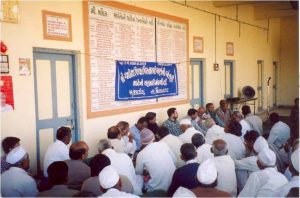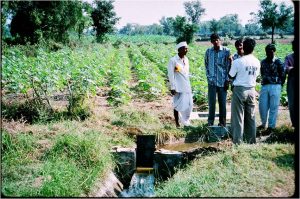Memo#156
By John R. Wood – johnroywood [at] gmail.com
 A series of new programs in India for community natural resource management (CNRM) is decentralizing control over local resources of water, forests, and inland fishing from government departments to end-users such as farmers, forest dwellers, and fishers.
A series of new programs in India for community natural resource management (CNRM) is decentralizing control over local resources of water, forests, and inland fishing from government departments to end-users such as farmers, forest dwellers, and fishers.
Despite the government’s “inclusive growth” policy and hope that the program will improve the lives of women, scheduled castes and tribes, minorities, tenants, the landless, and land-poor, only rarely do the poor or marginalized have any real impact on resource management.
In the Participatory Irrigation Management Program, control over irrigation operation and maintenance has been transferred to Water Users Associations. But in Madhya Pradesh, decentralization was compromised as government-appointed sub-engineers retained responsibility for secretarial and financial duties. This negatively affected farmers’ participation and productivity. In Gujarat, by contrast, where NGOs assisted in a “bottom-up” approach to management transfer, the results were more participatory and sometimes robustly democratic. Effective water delivery increased productivity and labour demand, resulting in higher wages for field workers.
Similarly in the Watershed Development Program, NGO efforts to improve land and water management in rainfed areas have been more successful than those initiated by government officials. But in both Madhya Pradesh and Gujarat, the overall impact of the program suffers from its short lifespan. Poverty reduction is minimal because dominant land-holding castes quickly capture the benefits.
Efforts to preserve forests under the Joint Forest Management Program show a similar pattern. In both Gujarat and Madhya Pradesh government-employed forest guards kept financial and secretarial records. All significant decisions had to be sanctioned by the states’ Forest Department. The situation in Gujarat was somewhat better as NGOs worked as the project implementation agency. In both states the programs are credited with an increase in forest cover, but poverty has been only marginally affected.
State government initiatives to encourage the growth of Inland Fishing Cooperatives in dam reservoirs also have the potential to benefit the poor. But in both Madhya Pradesh and Gujarat, fishermen are not able to participate fully in resource management dominated by Fisheries Department bureaucrats and large contractors.
Where decentralization is real and new ideas of governance have taken hold, CNRM programs have a chance. Only if communities of end-users gain more meaningful autonomy in running their own institutions for resource management will the goals of effective, equitable, and sustainable growth be reached.
About the Author:
John R. Wood – Honorary Professor, Centre for India and South Asian Research, The University of British Columbia. Project Leader of the Millennial Development Goals Project at the Gujurat Institute of Development Research, Ahmedabad, India.
Related information:
- The Memo draws on the findings of a collaborative research project supported by the Millennial Development Goals (MDG) programme of the Shastri Indo-Canadian Institute. Administered by the Institute of Asian Research at The University of British Columbia, the three partner institutions in India were the Development Support Centre, the Gujurat Institute of Development Research, and the Indian Institute of Forest Management.
Related Memos:
- Our other Memos about India.

